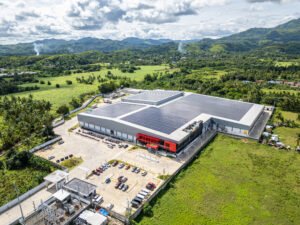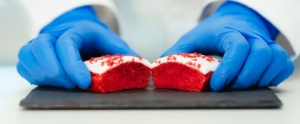Wednesday, 28 January 2026
Game-Changer for sustainable food: Nourish Ingredients’ Tastilux achieves commercial milestone
James Petrie, Co-Founder and CEO of Nourish Ingredients In a significant advancement for sustainable food, Australian biotech startup Nourish Ingredients has successfully achieved commercial-scale production of Tastilux, a precision-fermented fat…

James Petrie, Co-Founder and CEO of Nourish Ingredients
In a significant advancement for sustainable food, Australian biotech startup Nourish Ingredients has successfully achieved commercial-scale production of Tastilux, a precision-fermented fat that mimics the taste and texture of animal fats, without the use of animals. Leading this innovation is James Petrie, Co-Founder and CEO of Nourish Ingredients, who has guided the company from its research and development beginnings to this crucial moment for the alternative protein industry.
In an exclusive interview with NUFFOODS Spectrum, Petrie shares insights on how the company overcame technical challenges to scale Tastilux, the strategic advantages of its partnership with CABIO Biotech, and why ultra-low inclusion precision fats could be essential for mainstream consumer acceptance of plant-based foods. As demand for flavour and sustainability increases, Nourish Ingredients is positioning itself not just as a disruptor, but as a crucial player in the next generation of food innovation.
What does the successful commercial production of Tastilux mean for Nourish Ingredients and the precision fermentation industry?
The successful commercial production of Tastilux marks a major milestone for both Nourish Ingredients and the broader precision fermentation industry.
It establishes us as the first fat company in this space to achieve commercial-scale validation while maintaining a low cost of production, an industry-first that sets a new benchmark for what’s possible.
This milestone represents a 1700 per cent increase in our production capacity and proves that precision-fermented fats can be produced at scale, cost-effectively, and with minimal inclusion rates. The implications are transformative: food manufacturers can now access a highly potent fat that brings animalic flavour, mouthfeel, and aroma to plant-based foods, at just 1 per cent inclusion, without inflating their production costs or formulations.
More broadly, it validates the commercial model for precision fermentation. While many in the industry are still trying to scale, this achievement demonstrates that a capital-efficient partnership approach can overcome scale-up hurdles and deliver real economic returns. It’s a powerful signal to the market that precision fermentation is no longer a futuristic concept. It’s happening now, and it’s commercially viable.
What technical or operational challenges did you encounter while scaling up to commercial production, and how did your partnership with CABIO Biotech help resolve them?
One of our biggest foreseen challenges in scaling to commercial production was maintaining the performance and sensory quality of our fats at commercial volumes. CABIO Biotech brought proven fermentation infrastructure and deep technical expertise that helped us de-risk the scale-up, optimise processes, and ensure consistent product quality. This has enabled us to scale much faster than originally forecast. In addition, their regulatory know-how gives us a faster path into key markets like China and beyond.
You’ve noted achieving unbeatable production costs at scale. What factors contributed to this, and why is it important for the industry?
Achieving unbeatable production costs at scale comes down to a few critical factors. First is our ultra-low inclusion rate. Tastilux delivers a dramatic impact on flavour, aroma, and mouthfeel at just 1 per cent, which means we can meet significant end-product demand with relatively small production volumes. That efficiency is a major cost advantage, both for us and for the food manufacturers we work with.
Our partnership model is also key. By tapping into CABIO Biotech’s existing large-scale fermentation infrastructure, we avoided the typical capital and time burden of building out our facilities. CABIO’s proven experience producing fats for infant nutrition using the same microorganism enabled us to scale faster and with greater consistency.
Historically, cost has been a major barrier to commercialising fermented fats at scale. By proving it’s possible to deliver premium performance with a commercially viable cost structure, we’re showing that precision fermentation can move beyond R&D into real-world, profitable applications.
How has the market responded to Tastilux so far, particularly regarding its flavour, functionality, and versatility in plant-based formulations?
We recently conducted a consumer study in the US and Singapore to better understand how Tastilux enhances the appeal of plant-based foods. The study surveyed approximately 200 consumers and found that:
- Adding Tastilux to a leading plant-based product boosted consumer preference to purchase by 42 per cent (Singapore). Confirming a major shift in consumer willingness to adopt plant-based alternatives when taste expectations are met.
- Over 60 per cent of young consumers (ages 18-30) expressed a strong preference for plant-based products featuring our product Tastilux.
These findings underscore the importance of high-performance fats in making plant-based foods more appealing to mainstream consumers, a challenge Tastilux is uniquely positioned to solve.
What role do you see precision-fermented fats like Tastilux playing in the future of sustainable food systems, and how might they influence plant-based and alternative protein products?
Precision-fermented fats like Tastilux are set to play a critical role in building more sustainable and appealing food systems. One of the biggest barriers to the wider adoption of plant-based and alternative protein products is taste. Consumers still crave the rich, satisfying flavour and mouthfeel of animal fats. Tastilux bridges that gap by delivering authentic, animal-like flavour and aroma without the environmental footprint of animal agriculture. For our customers, providing an authentic mouthfeel and coating is also equally important, and we can provide both.
By using precision fermentation, we can produce these fats without land-intensive farming, deforestation, or the emissions associated with livestock. And because Tastilux is effective at just 1 per cent inclusion, it enables meaningful improvements in product quality with minimal resource input. That’s a powerful lever for sustainability and scalability.
What’s next for Nourish Ingredients? Are there plans to expand production, develop new products, or form new partnerships soon?
We’re working with several global food companies who are excited about how our product unlocks flavours previously unavailable to them.
While I can’t discuss specific agreements right now, I can share that we’re actively collaborating with alternative protein companies and global food manufacturers who recognise the transformative potential of our technology and products.
Shraddha Warde
shraddha.warde@mmactiv.com
Technology
Capel Marron Farm boosts Australia’s premium food investment credentials
Jan 28, 2026 | Australia
Tetra Pak invests €60Mn in owned pilot plant to advance paper-based barrier technology development
Jan 27, 2026 | Company News
Jollibee Group inaugurates VisMin Commissary in Philippines to support regional expansion
Jan 22, 2026 | Company News
Food Testing
NSF launches retail food safety audit program in ASEAN and Australia
Jan 19, 2026 | Australia
Bringing PFAS testing to the point of need
Jan 16, 2026 | Australia
IMCD opens a Food & Nutrition Laboratory in Cologne
Jan 08, 2026 | Company News
More Popular
Ready-to-stir BLG ingredient offers patient-friendly solution for medical nutrition
Jan 28, 2026 | Company News
Sparkling Ice LIFE SAVERS collab brings four new candy-inspired flavours
Jan 28, 2026 | Beverages
Acker embarks on new era across Europe & Asia with launch of Acker Wine Merchant in Singapore
Jan 28, 2026 | Beverages






